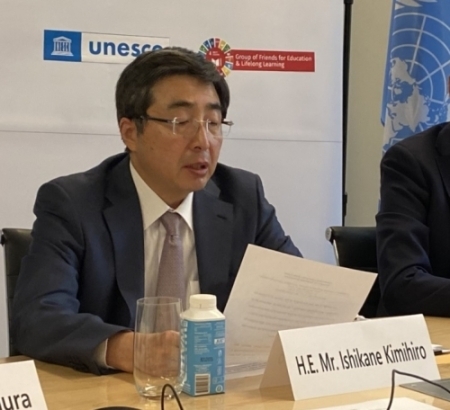HLPFサイドイベント 持続可能な開発のための教育(ESD)における石兼大使開催挨拶
令和4年7月12日

On behalf of the five Co-Chairs of the Group of Friends for Education and Lifelong Learning, I would like to welcome all of you who are connecting from all over the world to this side-event to the HLPF on Education for Sustainable Development (ESD). I would also like to extend our warm welcome and appreciation to our distinguished guests and panel speakers who will share their rich experiences and expertise in the area.
As we discussed at the education review session last Tuesday at the HLPF, the education sector is currently facing a number of challenges. The COVID-19 pandemic disrupted learning opportunities for millions of children and youth, and exacerbated educational inequalities across the world. This adds to the challenges from the pre-pandemic period: many children and youth, particularly in conflict-affected countries, remain out of school, and many students who are in school are not achieving minimum learning levels in reading and mathematics. Furthermore, we need to address evolving skills and training demands required by evolving socio-economic circumstances, such as the transitions to green and digital economies.
I would like to emphasize that in an age of uncertainty, the best way forward is to invest in people, and education is the most powerful tool to help people to make the right decisions to tackle our common agenda and achieve the SDGs. In this regard, I believe that Education for sustainable development (ESD) is an integral element of the SDGs on quality education and a key enabler of all other goals. ESD reassesses what we learn, where we learn, and how we learn to ensure that we develop the knowledge, skills, values, and attitudes that enable us to make informed decisions and actions on global challenges to human security. Global practices on ESD around the world suggest that children and youth can learn to live cooperatively, think critically, respect diversity, care for the environment, and be actively involved in finding solutions, both locally and globally. All member states should further support each other by strengthening global networks to advance ESD.
This session is therefore aiming to learn from good practices generated by different countries and organizations in mainstreaming ESD at both the policy and implementation levels. It also aims to showcase the evidence-based innovations and benefits of integrating ESD into all levels of education and training, from early childhood to tertiary and adult education, so that all individuals are provided with lifelong opportunities to fully develop their human potential. I am also expecting that some key outcomes of this session will feed into our ongoing discussions toward the Transforming Education Summit (TES) in September.
I am looking forward to hearing your views and insights around ESD practices and further strengthening our partnerships and collaborations in the area through our rich discussions.
Thank you.
